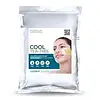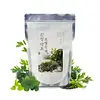What's inside
What's inside
 Key Ingredients
Key Ingredients

 Benefits
Benefits

 Concerns
Concerns

 Ingredients Side-by-side
Ingredients Side-by-side

Diatomaceous Earth
AbrasiveCI 77231
Cosmetic ColorantGlucose
HumectantAlgin
MaskingTetrapotassium Pyrophosphate
BufferingCellulose Gum
Emulsion StabilisingMaltodextrin
AbsorbentSorbitan Fatty Acid Ester
EmulsifyingLactococcus Ferment Extract
Skin ConditioningMelaleuca Alternifolia Leaf Powder 0.15%
AbrasiveAllantoin
Skin ConditioningPotassium Alginate
Emulsion StabilisingAdenosine
Skin ConditioningAloe Barbadensis Leaf Juice Powder
Skin ConditioningBetaine
HumectantUltramarines
Mentha Piperita Oil 0.1%
MaskingDiatomaceous Earth, CI 77231, Glucose, Algin, Tetrapotassium Pyrophosphate, Cellulose Gum, Maltodextrin, Sorbitan Fatty Acid Ester, Lactococcus Ferment Extract, Melaleuca Alternifolia Leaf Powder 0.15%, Allantoin, Potassium Alginate, Adenosine, Aloe Barbadensis Leaf Juice Powder, Betaine, Ultramarines, Mentha Piperita Oil 0.1%
Diatomaceous Earth
AbrasiveGlucose
HumectantCI 77231
Cosmetic ColorantAlgin
MaskingTetrasodium Pyrophosphate
BufferingMagnesium Oxide
AbsorbentArtemisia Caruifolia Powder
AbrasiveCellulose Gum
Emulsion StabilisingChlorella Vulgaris Powder
Skin ConditioningTheobroma Cacao Fruit Powder
Skin ConditioningArtemisia Princeps Leaf Extract
Skin ConditioningHouttuynia Cordata Powder
Skin ConditioningSolanum Melongena Fruit Extract
Skin ConditioningCentella Asiatica Extract
CleansingCamellia Sinensis Leaf
PerfumingCamellia Sinensis Leaf Powder
ExfoliatingCamellia Sinensis Leaf Extract
AntimicrobialPortulaca Oleracea Extract
Skin ConditioningOpuntia Coccinellifera Flower Extract
Skin ConditioningAloe Barbadensis Leaf Juice Powder
Skin ConditioningPinus Densiflora Leaf Extract
AntimicrobialCamellia Japonica Leaf Extract
Skin ConditioningPaeonia Lactiflora Extract
AstringentGlycyrrhiza Glabra Root Powder
Skin ConditioningAllantoin
Skin ConditioningBetaine
HumectantKaolin
AbrasiveMaltodextrin
AbsorbentDehydroacetic Acid
PreservativeDiatomaceous Earth, Glucose, CI 77231, Algin, Tetrasodium Pyrophosphate, Magnesium Oxide, Artemisia Caruifolia Powder, Cellulose Gum, Chlorella Vulgaris Powder, Theobroma Cacao Fruit Powder, Artemisia Princeps Leaf Extract, Houttuynia Cordata Powder, Solanum Melongena Fruit Extract, Centella Asiatica Extract, Camellia Sinensis Leaf, Camellia Sinensis Leaf Powder, Camellia Sinensis Leaf Extract, Portulaca Oleracea Extract, Opuntia Coccinellifera Flower Extract, Aloe Barbadensis Leaf Juice Powder, Pinus Densiflora Leaf Extract, Camellia Japonica Leaf Extract, Paeonia Lactiflora Extract, Glycyrrhiza Glabra Root Powder, Allantoin, Betaine, Kaolin, Maltodextrin, Dehydroacetic Acid
 Reviews
Reviews

Ingredients Explained
These ingredients are found in both products.
Ingredients higher up in an ingredient list are typically present in a larger amount.
Algin is brown algae. Algae is an informal term for a group of aquatic organisms that can photosynthesize. It is estimated there are at least 30,000 types of Algae.
Algae contains antioxidants. Antioxidants help fight free-radicals. Free-radicals are molecules that may damage your skin cells, such as pollution.
Allantoin is a soothing ingredient known for its protective and moisturizingg properties. Because of this, it is often added to products with strong active ingredients.
Studies show higher concentrations of this ingredient can promote wound healing.
Though it can be derived from the comfrey plant, allantoin is produced synthetically for cosmetic products to ensure purity.
Learn more about AllantoinAloe Barbadensis Leaf Juice Powder comes from the aloe plant.
You may know Aloe to be a good sunburn reliever and inflammation reducer. This is because it contains many components that are known to help reduce irritation and itchiness.
Aloe leaves are also great moisturizers. They are naturally rich in polysaccharides, a carbohydrate made of sugars. Polysaccharides are able to mimic the carbs found in the top layer of your skin. This can help keep your skin hydrated.
Aloe contains the antioxidants Vitamins A, C, and E. These vitamins neutralize free radicals. Free-radicals are molecules that may damage your skin cells, such as pollution.
Aloe does not protect against UV rays, despite it soothing sunburns.
Learn more about Aloe Barbadensis Leaf Juice PowderBetaine is a common humectant (a substance that promotes retention of moisture). It's known to be gentle on the skin and can help balance hydration.
This ingredient is best for improving hydration and soothing irritated skin. Studies also show it helps even out skin tone.
Fun fact: Betaine is naturally created in the skin and body. The kind found within cosmetic products can be either plant-derived or synthetic.
Another name for betaine is trimethylglycine.
Learn more about BetaineCellulose Gum is a water-soluble polymer that comes from cellulose. It is used to change the texture of a product and to help stabilize emulsions.
As an emulsifier, cellulose gum specifically thicken the texture of water-based products.
This ingredient is considered hypoallergenic and non-toxic. Cellulose Gum can be found in cosmetics, food, and other household goods such as paper products.
Learn more about Cellulose GumWe don't have a description for CI 77231 yet.
Diatomaceous Earth is an exfoliant.
Glucose is a simple sugar and is the most important source of energy in all organisms.
In skincare, glucose is used to hydrate the skin. It also acts as a prebiotic for our natural biome.
Glucose is hydrating due to its humectant property. As a humectant, glucose draws moisture from the air and from deeper levels in the skin.
Our skin contains many sugars that act as prebiotics and help strengthen our natural microbiome. Having a healthy microbiome helps protect our skin from harmful bacteria and other contaminants.
Studies show glucose may help with fading discoloration and pigmentation. This is because our skin metabolizes glucose into lactic acid. Lactic acid is an AHA that helps exfoliate the top layer of skin.
Learn more about GlucoseMaltodextrin is a polysaccharide. It is derived from starch such as rice, corn, wheat, or potato starch.
In food, Maltodextrin is used to improve the texture and thicken a product. Due to its structure, it can help create a gel texture. As an emulsion stabilizer, it helps keep the ingredients in a product together.
As a polysaccharide, Maltodextrin has moisturizing properties. Polysaccharides are a type of carbohydrate. The top layer of skin uses polysaccharides to retain water, keeping the skin hydrated.
Maltodextrin is water soluble and has a sweet taste.
Learn more about Maltodextrin